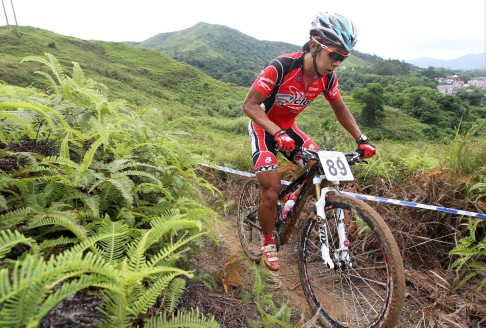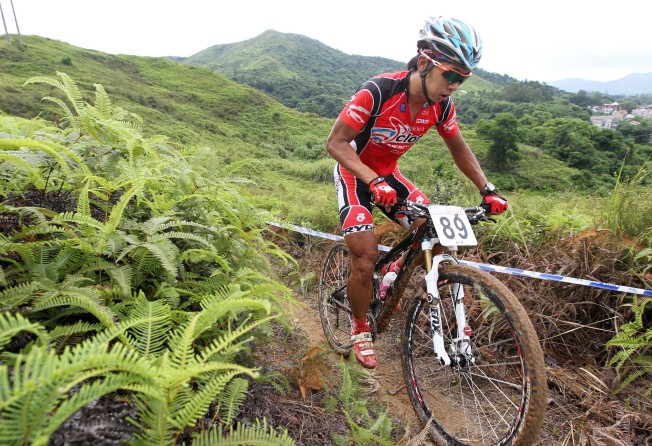
On the right track: Mountain biking on the increase in Hong Kong
Mountain biking in the city has hit top gear thanks to government support. But there are still bumps in the road


That's how writer and photographer Matt Wragg described his experience riding mountain bike trails on Lamma Island in the April issue of Mountain Biking UK magazine.
The AFCD now understands that mountain bikers need single tracks and flow trails, not staircases and tarmac
Wragg thought Hong Kong was only hustle, bustle and urban sprawl - "my idea of hell", he wrote - but was pleasantly surprised by the city's riding opportunities after being given a tour by Hong Kong Mountain Bike Association's (HKMBA) vice-chairman Kenneth Lam.
A growing number of Hongkongers are discovering the thrills of mountain biking in the territory. Last year, the Agriculture, Fisheries and Conservation Department (AFCD) issued 7,311 mountain bike permits, a 130 per cent increase from 2009. More than 24,260 permits have been issued in the past five years. The permits, which are free and valid for two years, are compulsory for anyone who wants to ride on designated mountain bike trails in Hong Kong's country parks.
Steve Coward, who offers mountain bike training and tours through his website Crosscountry HK, says he's had 10 to 20 per cent more clients each year since starting the company in 2007. His clients range from middle-aged corporate types, to road cyclists making a switch, to kids and the health-conscious in general.
There are more designated trails to ride mountain bikes in Hong Kong than ever - with more being planned. In all, there are nine mountain bike trails in different country parks, totalling about 113 kilometres, along with a site in Sai Kung West Country Park (Wan Tsai Extension).
When Pierre-Arnaud Le Magnan moved to the city 18 years ago, there were virtually no mountain bike trails. "There are more now, but there's still a lack of proper trails," says the Frenchman
According to a study in March 2011 by the International Mountain Bicycling Association (IMBA) on Hong Kong's mountain biking trails, commissioned by the AFCD, almost 26 kilometres of the designated trails are in fact paved roads.
Most of the trails are not purpose built for the sport, but are hiking trails designated by the government as legal for cyclists. There is therefore an abundance of cement, steps, obstacles and inclines too steep or dangerous to ride up or down. "The majority of the trails aren't beginner friendly," says Coward.
"Most are a joke to ride on and some are difficult staircase trails that even hikers have difficulty on," adds Michael Maddess, director of the Action Asia Foundation, organisers of off-road races for runners and cyclists.
Quantity is also lacking, the riders say. Mountain bike trails make up only one per cent of the more than 1,000 hiking trails in Hong Kong.
But there has been progress. Last year, the AFCD was given HK$5.7 million to improve the mountain bike trail network in Tai Lam Country Park. Some of it was spent on a 1.4-kilometre extension to the Ho Pui section in March this year, as well as on improvements to the Tai Lam Chung trail. This follows other major enhancements to the Tai Lam mountain bike trail network, including the construction of the 400-metre practice loop in May 2011 and the 2.1-kilometre Tin Fu Tsai North section trail in March last year.
"These new trails were designed and built in accordance with the sustainable trail principles promoted by the IMBA," according to an AFCD spokesman.
The department is in the planning stage of developing a sustainable trail of approximately four to five kilometres from the Tin Fu Tsai fire lookout to the area near Kat Hing bridge.
This route - as well as the recent trail improvements - was suggested by IMBA specialists in their 2011 report, in which they looked at the trail and network design, reduction of user conflict, improvement of signage and setting up of a trail difficulty grading system. The findings are being used to improve existing trails so they meet international standards "as far as practicable", says the AFCD spokesman.
"Occasionally there are complaints against mountain bike activities such as cycling at high speed, cycling outside designated mountain bike trails, causing disturbance to hikers and local villagers or aggravating soil erosion in country parks," he says. "All these need to be considered during the management of mountain biking activities in country parks."
IMBA trail specialist Lim Hui-min helped build the new Ho Pui section and has conducted mountain bike workshops for about 200 AFCD staff members since 2011. Lim says the government's view of the sport has changed.
"The AFCD now understands that mountain bikers need single tracks and flow trails, not staircases and tarmac. It's important to find a solution that balances the AFCD's needs and regulations, the riders' needs and environmental sustainability."
A sustainable trail, explains Lim, works all seasons with minimal maintenance.
It should be mostly contour trails that meander up the side of a mountain, rather than a fall line - the shortest line from the base to the summit.
"[Sustainable trails] allow for shared or segregated use by hikers and bikers, while ascending and descending gradually," says Brandon Kirk, HKMBA's director of public affairs. "They require less emissions to build - using natural, local materials - and have lower construction costs, both financial and ecological.
"Unfortunately, new concrete and handrailing eyesores are still infesting our mountainsides, and new paving projects seem to go forward every season."
The AFCD recently cemented a 10-metre eroded area adjacent to a mountain bike trail in Tai Lam Country Park. Maddess says this is dangerous and has upset many mountain bikers.
A mountain bike's knobby tyres - designed to grip loose dirt - do not get along with smooth cement. Not only is it slippery but, Coward says, speed tends to pick up on cement, increasing the risk of a crash.
The AFCD spokesman says the surface was hardened to prevent further erosion. He says further work will be done "to address [the mountain bike community's] concern".
Lamma Island, in fact, isn't one of AFCD's designated mountain bike trails as it's under the purview of the Lands Department. It's a popular spot for riders, though organised events were banned there two years ago.
Maddess says he organised a five-hour mountain bike race there for five years, but stopped after villagers complained it was bad fung shui and too noisy.
"It's a pity because there's potential to stage a world-class mountain bike championship there," says Maddess.
"It's a perfect six-kilometre loop course with stunning single track, epic views, great downhills and challenging berms and turns."
While Maddess appreciates the progress the AFCD is making, like the rest of the mountain bike community, he laments that progress is slow.
"The mountain biking population is growing in Hong Kong, and riders are getting desperate for more trails."
For more on mountain biking, check out Thursday's special 48 Hours health issue
